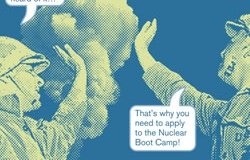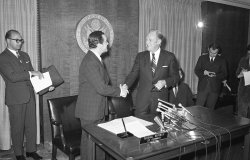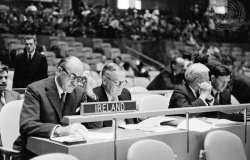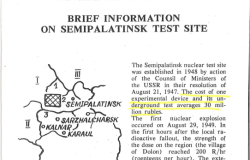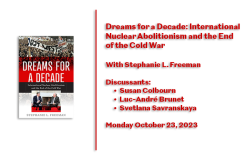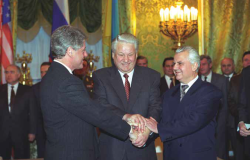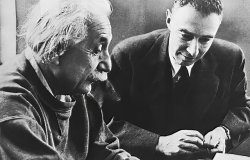Participants to the 2016 Nuclear History Boot Camp
NPIHP’s summer 2015 Nuclear History Boot Camp will be hosted by the University of Roma Tre and the Machiavelli Center for Cold War Studies (CIMA) at a former ACE HIGH NATO communications relay site in the village of Allumiere near Rome, Italy for ten days, June 12 - 22, 2015.

Maysam Behravesh has an MA (Summa cum laude) in International Relations from the University of Tehran, Iran, and is a PhD candidate in Political Science at Lund University, Sweden. His research interests center broadly around security studies, nuclear politics, political psychology and terrorism with an empirical focus on the Middle East and South Asia. More specifically, Maysam's doctoral thesis explores the impact of identity motives, collective historical narratives and emotive drives on the nuclear behavior of states with revisionist tendencies (Iran and Pakistan in this case), deploying ontological security theory and narrative methodology for the purpose.
 Andrea Chiampan is a PhD candidate in the Department of International History at the Graduate Institute of International and Development Studies of Geneva (IHEID). Prior to joining NYU as Agnese N. Haury dissertation scholar, Andrea was a visiting research student at the London School of Economics and Political Science (LSE) and Swiss National Science Foundation (SNSF) research assistant at IHEID. He obtained both his BA and MA in Italy at the University of Padua. His dissertation deals with the history of NATO nuclear strategy and politics in the 1970s and 1980s, and it focuses in particular on the controversial decision to deploy new intermediate nuclear forces in Europe. As a fellow at the Tamiment Library, Andrea will be conducting research on the "Mobilization for Survival" papers, analyzing the group's role in cementing a coalition between anti-nuclear energy and peace groups across the United States. Andrea's recent publications include articles on transatlantic political relations under the Reagan administration published in the journals Diplomacy & Statecraft and The International History Review.
Andrea Chiampan is a PhD candidate in the Department of International History at the Graduate Institute of International and Development Studies of Geneva (IHEID). Prior to joining NYU as Agnese N. Haury dissertation scholar, Andrea was a visiting research student at the London School of Economics and Political Science (LSE) and Swiss National Science Foundation (SNSF) research assistant at IHEID. He obtained both his BA and MA in Italy at the University of Padua. His dissertation deals with the history of NATO nuclear strategy and politics in the 1970s and 1980s, and it focuses in particular on the controversial decision to deploy new intermediate nuclear forces in Europe. As a fellow at the Tamiment Library, Andrea will be conducting research on the "Mobilization for Survival" papers, analyzing the group's role in cementing a coalition between anti-nuclear energy and peace groups across the United States. Andrea's recent publications include articles on transatlantic political relations under the Reagan administration published in the journals Diplomacy & Statecraft and The International History Review.

Dmytro Chumak is a PhD candidate in Political Sciences at the Odessa National I. I. Mechnikov University (Ukraine). Currently he is a research consultant at the Odessa center for nonproliferation. His research interests cover nuclear history of Ukraine, the history of nuclear energy development in independent Ukraine, with particular focus on the influence of Chernobyl accident.

Catherine Dill works in the East Asia Nonproliferation and Export Control and Nonproliferation programs at the James Martin Center for Nonproliferation Studies (Monterey) where she focuses on China's nuclear and missile programs and nonproliferation and export control policies; open source analysis and research on emerging technologies; and, mapping illicit procurement activity in Asia. Her current research centers on the US withdrawal of nuclear weapons from the Korean Peninsula in 1991. Previously, Catherine worked as a consultant at Booz Allen Hamilton as an analyst in Washington, DC. She holds a MA in Nonproliferation and Terrorism Studies from the Middlebury Institute of International Studies at Monterey, and a BS in Foreign Service from Georgetown University’s Walsh School of Foreign Service.

Anthony Eames is a Ph.D. candidate in transregional history at Georgetown University where he specializes in the history of science and technology during the Cold War. He writes on the British and American nuclear establishments and their impact on diplomacy, culture, society, and scientific practice.

Ilona Gubareva graduated from American University of Central Asia (Bishkek, Kyrgyzstan) with a Bachelor in Cultural Anthropology and Archaeology and Tomsk State University with a Master in International Relations. Currently she is assistant lecturer at the Center of European studies, Tomsk State National Research University. Her research interests are nuclear non-proliferation, global security, European studies.

Sumiko Hatakeyama is a Ph.D. student in History and Sociology of Science at the University of Pennsylvania. Sumiko is interested in exploring the history of nuclear weapons from radiation risk perspective: how radiation risk has been understood, framed and weighed against other risks; and how such risk perceptions, in turn, have influenced nuclear policies. Sumiko previously worked for Peace Boat, a Japan-based international NGO. With Peace Boat, she travelled to over 20 countries with the atomic-bomb survivors, testifying to the humanitarian consequences of nuclear weapons. She has a BA (Hons) in Politics, Psychology and Sociology (PPS) from University of Cambridge.

Katrin Heilmann is a Yenching Scholar at Peking University where she pursues a MA in China Studies with a specialization in Politics and International Relations. Born and raised in Germany, she holds an MA (hons) Chinese and History from the University of Edinburgh. Her Master’s dissertation looks at China, the national epistemic community and the international disarmament and non-proliferation regime, 1985-1997. Her wider research interests include Chinese nuclear history, Sino-European relations during the Cold War and Chinese foreign policy.

Ji Yeon Jung holds a Ph.D. from Jawaharlal Nehru University, New Delhi. She currently works on India's nuclear debate since independence, and the science and politics in India. She was a visiting fellow at Institute of Indian Studies, Seoul (2014-15) and Centre for Air Power Studies, New Delhi (2011-2014). She currently works as a executive secretary in Korean Society for Indian Studies and teaches at Hankuk University of Foreign Studies, Seoul.
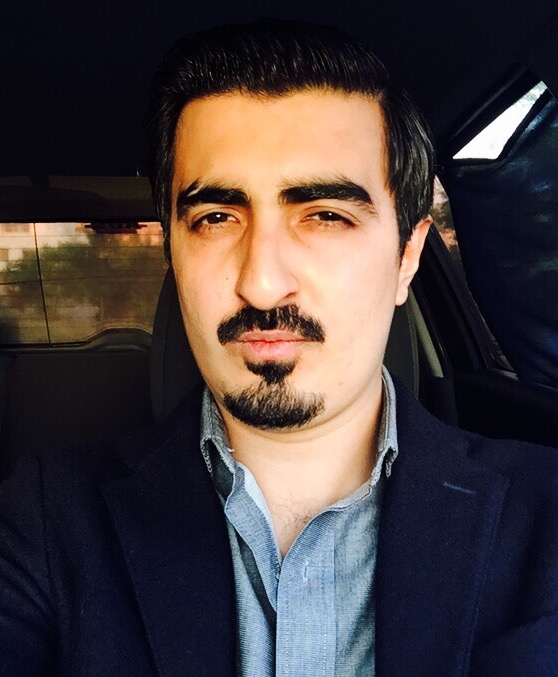
Ali Mustafa is an M.A. in Nonproliferation & Terrorism Studies from Middlebury Institute of International Studies at Monterey, California. His capstone research was undertaken at the Cooperative Monitoring Centre, Sandia National Laboratories, titled “Challenges to National Nuclear Forensics Library in Pakistan”. He also holds an M.Sc. in Strategic & Nuclear Studies from National Defence University Islamabad. Currently he is working as a Research Associate at Centre for Security, Strategy & Policy Research (CSSPR) and lecturer at Social Sciences Department of University of Lahore, Pakistan. His areas of interest include Nonproliferation, Nuclear Technology & Trade, Strategic Stability in South Asia, and Terrorism Studies.

Rita Paroda has a master’s degree in History with Military History specialization from the Pazmany Peter Catholic University, Hungary. She wrote a thesis about the concept of war and peace within the Warsaw Pact. Currently she is a PhD candidate in History-Military History at the same university. Her dissertation examines the Hungarian and Soviet strategic war plans during the late Cold War period, so she analyzes Warsaw Pact and NATO documents. Her research interests include military history, foreign policy, grand strategy, nuclear strategy during the Cold War.
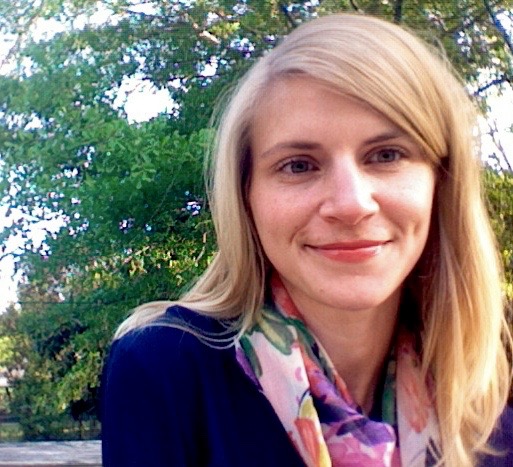 Caroline Peyton is a PhD candidate in History at the University of South Carolina. Her dissertation, "Radioactive Dixie: A History of Nuclear Power and Nuclear Waste in the American South, 1950-1990," examines the political, cultural, social, and environmental dimension of the nuclear industry in the American South. Prior to doctoral studies, she received an MA in History from the University of South Carolina and graduated with honors from the University of Arkansas, earning a BA in History and a BA in English. Her scholarly interests include environmental history, energy history, history of science and technology, public policy, and the American South.
Caroline Peyton is a PhD candidate in History at the University of South Carolina. Her dissertation, "Radioactive Dixie: A History of Nuclear Power and Nuclear Waste in the American South, 1950-1990," examines the political, cultural, social, and environmental dimension of the nuclear industry in the American South. Prior to doctoral studies, she received an MA in History from the University of South Carolina and graduated with honors from the University of Arkansas, earning a BA in History and a BA in English. Her scholarly interests include environmental history, energy history, history of science and technology, public policy, and the American South.
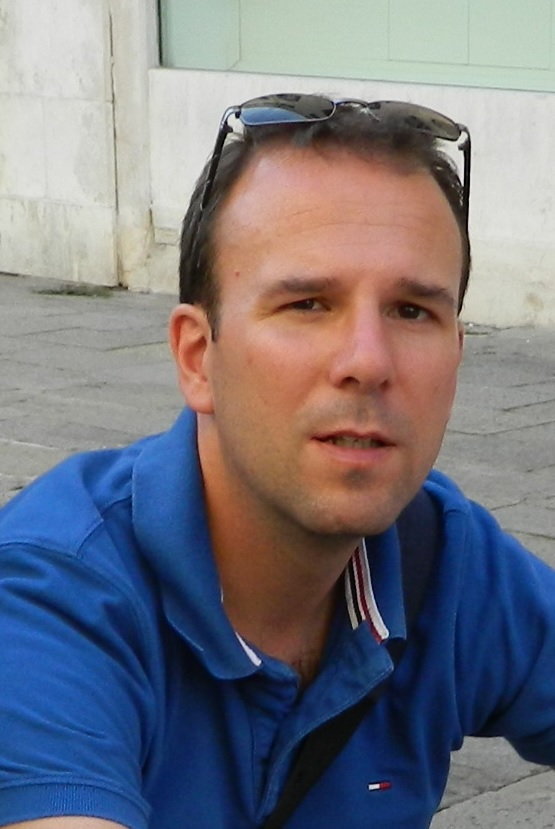
Yannick Pincé teaches History and Geography in both language (french and german) at the Lycée Jean-François Millet, a high school (Cherbourg-en-Cotentin, France, a port where SSBN are assembled). He is a PhD candidate in History at the University of Sorbonne Nouvelle Paris 3 (Paris, France). His dissertation concerns the French strategic debate in the eighties. He studies the links between the content of military doctrine and its strategic or operational reality but the central question is about the nuclear consensus during the first socialist presidency. He holds a Master’s degree in History and his academic interests include the interactions between strategy, domestic and international policy. With other teachers he founded a pedagogical book collection “teaching differently” in which he wrote articles to make his colleagues aware of geopolitical, strategic and international problems. His father served in the French strategic air force. He has other interests in the Wars of Religion, French Revolution, cultural heritage and mountain sports.
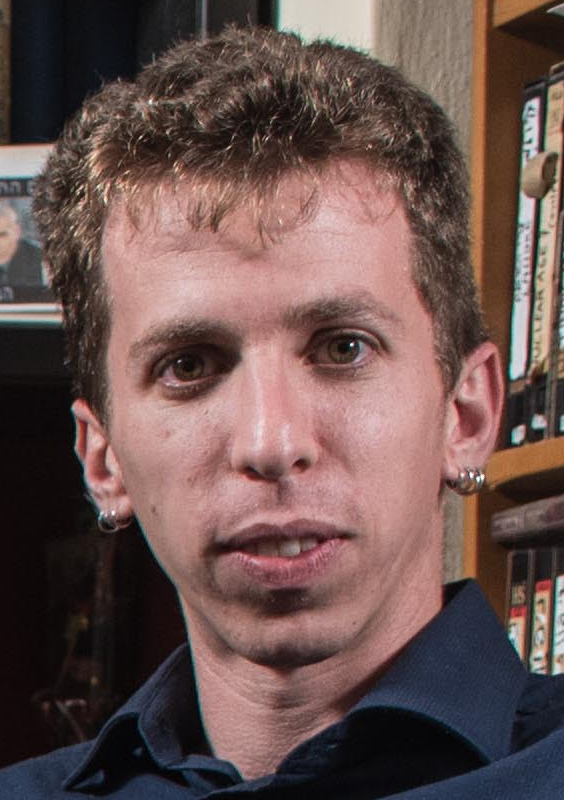
Adam Raz is an Israeli historian whose field of research is political history of the twentieth century (especially the history of nuclear weapons) and Marxist thought. He recently published a book about Israel's nuclear history ("The Struggle for the Bomb"), with an emphasis on the domestic debate inside Israel. His book on the history of the Zionist movement in the context of international relations will be published at the end of the year. He is currently focusing his research on the debate inside U.S political class (and Big Business) regarding the nuclear issue at the end of the Second World War and during the Cold War. He continues to focus his research on Israel's nuclear history.

Gaurav Sharma is a Postdoctoral Researcher at the Centre for International Politics, Organization and Disarmament (School of International Studies) at Jawaharlal Nehru University. His PhD thesis dealt with India's arms control and disarmament diplomacy, analysing in particular three specific disarmament initiatives that India took under Prime Ministers Jawaharlal Nehru, Indira Gandhi and Rajiv Gandhi. His research interests include the global history of nuclear weapons, India's nuclear history and diplomacy, and evolution of Indian foreign policy. Currently, he is working on his book that traces India's nuclear diplomacy from 1946 to 1996, for which he is engaged in extensive archival research in India.
Laura Stanley is a Doctoral Candidate in History at Victoria University, Australia (VU). She holds a Bachelor of Laws (with Honours)/Bachelor of Arts and Honours in History from VU. Laura’s doctoral dissertation examines Australia’s policy on the Cuban Missile Crisis in the context of its alliance with the United States. She has published her research in the Australian Journal of Politics and History, an edited book, and online on The Conversation. She has also been interviewed about her research by the Australian Broadcasting Corporation (ABC) for a programme aired on national and local radio. Laura’s wider research interests include Cold War history, diplomatic history, nuclear weapons policy, non-proliferation, disarmament, and Australian foreign and defence policy.
Related Programs

Nuclear Proliferation International History Project
The Nuclear Proliferation International History Project is a global network of individuals and institutions engaged in the study of international nuclear history through archival documents, oral history interviews, and other empirical sources. At the Wilson Center, it is part of the Wilson Center's History and Public Policy Program. Read more

Cold War International History Project
The Cold War International History Project supports the full and prompt release of historical materials by governments on all sides of the Cold War. Through an award winning Digital Archive, the Project allows scholars, journalists, students, and the interested public to reassess the Cold War and its many contemporary legacies. It is part of the Wilson Center's History and Public Policy Program. Read more

History and Public Policy Program
The History and Public Policy Program makes public the primary source record of 20th and 21st century international history from repositories around the world, facilitates scholarship based on those records, and uses these materials to provide context for classroom, public, and policy debates on global affairs. Read more


